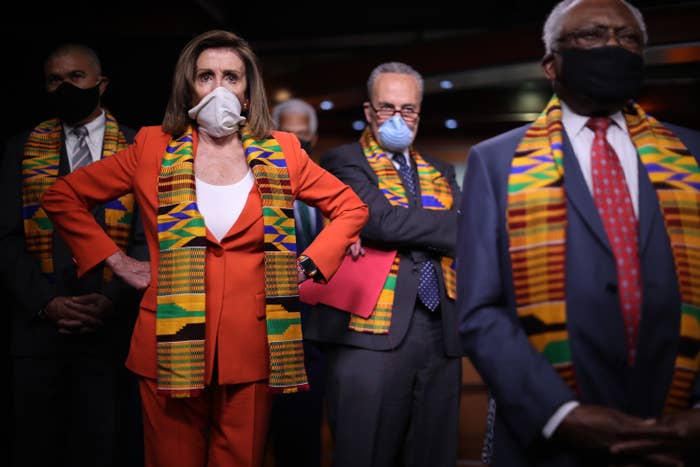
Democrats proposed a sweeping package of policing reforms Monday that would ban chokeholds, end no-knock warrants in drug cases, create a national police misconduct registry, and limit qualified immunity that shields officers from being sued.
The Justice in Policing Act has been in the works since George Floyd was killed in the custody of the Minneapolis police, sparking nationwide anti–police violence protests. The bill would put police officers under more scrutiny and limit their ability to use violent force. But it does not adopt the policies of the grassroots “defund the police” movement, which has become a rallying cry at protests.
Democrats expressed sympathy and understanding for the “defund the police” movement, but their bill does not substantially restructure police funding.
“I can’t imagine that happening in a federal way,” said Congressional Black Caucus Chair Rep. Karen Bass. “But let me just tell you that part of that cry is a desire for there to be a significantly higher investment in communities.”
The Justice in Policing Act aims to make use of deadly force a last resort by changing the national use of force standard from it being “reasonable” to the higher bar of “necessary to prevent death or serious bodily injury.”
“As we all know, we can reason away just about anything. The appropriate and fair question to ask is ‘Was it necessary?’” said Sen. Kamala Harris.
The bill would ban police use of chokeholds and no-knock raids where police can storm into a home without identifying themselves. This was the type of search that led to the death of Breonna Taylor, a 26-year-old unarmed black woman in Louisville, Kentucky, who was shot to death in her home by police.
These changes would be enacted directly for all federal policing agencies. Technically the federal government cannot dictate policies like a chokehold ban to state and local police agencies. Instead, the bill conditions funding and grants to local jurisdictions on them complying with the federal standard. Denying funding has been an effective way to make states follow national standards such as speed limits.
House Majority Leader Steny Hoyer said the bill could move through committee and be ready for a floor vote in the next two weeks.
The bill is likely to pass the Democrat-controlled House, but its fate is far more uncertain in the Senate where Republicans have control. Senate Majority Leader Mitch McConnell ultimately controls what goes to a floor vote and has consistently refused to take up Democratic bills passed by the House.
Asked repeatedly by BuzzFeed News last week if he plans to allow a floor vote for any criminal justice legislation, he stared ahead and did not answer.
Senate Majority Whip John Thune said some Republican members had proposed ideas, but did not say who they were or what they were advocating. Asked last week about what changes Republicans could embrace, Sen. Ted Cruz said he would judge any proposals on their merits, but that his immediate focus is violence at protests.
“In the midst of rioting and acts of violence across the country the first priority has to be stopping the violence, keeping people safe,” said Cruz.
On the Justice in Policing Act, Senate Minority Leader Chuck Schumer said Monday that “Democrats are going to fight like hell to make this a reality.” But with the Senate not even able to pass an anti-lynching bill — Republican Sen. Rand Paul said the bill was too broad — larger reforms that would be fought vigorously by police unions would be difficult to pass before the election.
“I know a lot of people don’t want to think of this as an electoral moment because November is a long way away, but the reality is very little can change so long as Trump is in office and McConnell runs the Senate,” said Democratic Sen. Chris Murphy.
The Justice in Policing Act is set to be the framework of Democratic social justice policy in the election. Other policies in the package include creating a federal police misconduct registry so that officers cannot switch agencies and start with a clean slate. The registry would track police misconduct complaints, discipline records, and dismissals.
The bill would direct the attorney general to create policing best practices and accreditation standards, as well as collect data on the racial distribution of drug charges, traffic and pedestrian stops, and the use of deadly force by police. The bill would give the Department of Justice subpoena power to investigate police forces.
The bill would limit qualified immunity laws, making it easier for people to sue a police officer if their constitutional rights are violated. It would also limit the transfer of military-grade equipment from the federal government to state and local police departments.
